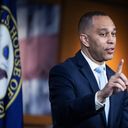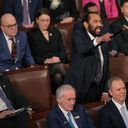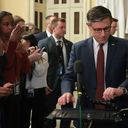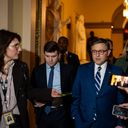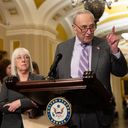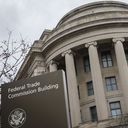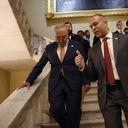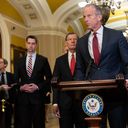Senate Democrats punt on trans rights in women's sports
Senate Democrats want to leave the issue of trans athletes playing in women's sports to state and local governments.
Why it matters: Democrats privately admit they need a sharper response to counter Republican attacks on their support for transgender rights, especially when it involves sports.
- In the Senate, their emerging strategy is to argue that one part of the issue is best left to the states, while acknowledging concerns about athletes gaining an unfair advantage.
- "There are basic issues of fairness here," said Sen. Cory Booker (D-N.J.) "There are really important issues that we should be discussing on the local level, within sports leagues and within conferences."
Between the lines: The Democratic messaging effort has been spearheaded by Sen. Tammy Baldwin (D-Wis.), sources tell Axios.
- Baldwin, the first openly gay person elected to the Senate, faced a barrage of attacks on the topic in her 2024 reelection campaign.
- She feared Republicans were flooding the zone with their attacks without Democrats having a clear and consistent rebuttal.
- "Republicans in Washington are saying they know better than parents and local school districts," she said in a statement. "They are wrong. I trust parents, schools and local sports leagues to make these decisions for their children."
Zoom in: The issue was thrust into the public Thursday by California Gov. Gavin Newsom (D), who broke with progressives by saying transgender participation in sports was an "issue of fairness."
- "It's deeply unfair," Newsom, a potential 2028 presidential candidate, told Charlie Kirk on his inaugural podcast, "This Is Gavin Newsom."
- Senate Democrats this week blocked a bill that would have banned trans athletes from women's sports. Not a single Democrat voted to bring the bill to the floor.
What they are saying: Some Senate Democrats agreed with Newsom on the sports fairness issue, but they said to be careful that the overall conversation doesn't demonize transgender athletes. They also want to avoid federal overreach.
- "It's leading to more bullying. It's leading to more mental health issues as people are feeling targeted," Booker told Axios. "Yes, when it comes to sports leagues, they have to find a way to create fairness."
- Said Sen. Angus King (I-Maine): "I understand the concern. I have a daughter who was a high school athlete. Interestingly, when I asked her about this issue, she said, by all means, there should not be a federal ban."
- "Every state and every community is going to come to their own decision on it," Sen. Chris Murphy (D-Conn.) told Axios.
The bottom line: "Everyone deserves a level playing field, but the governing bodies — the parents, the coaches, the NCAA ... need to make those decisions," said Sen. Jacky Rosen (D-Nev.).
- "We let local schools make those kinds of decisions," said Sen. Gary Peters (D-Mich.) "There's no one set of facts. These are going to be pretty complicated situations."


